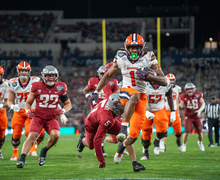Cornell’s GMO debate illustrates importance of student activism
/ The Daily Orange
Students have contributed to revolutionizing our political and social system before, but with every victory or success, we must continue passionately to create an egalitarian and sustainable world we are proud to call our own.
Robert Schooler’s GMO WTF project at Cornell University is exactly this: a call to action, awareness and awakening amongst student populations. Not only is Schooler’s project an online resource to educate students, but it’s also a lecture series. After starting on Sept. 7, the talks run every Wednesday night and are expert-backed. Wednesday’s lecture is about bioengineering.
Where conversation is lacking on campus, students should look into organizing events that shed light on social issues. With the recent increase in corporatization of universities, students can give a more balanced perspective. Education is not just about absorbing knowledge: the critical thinking aspect also should come into play. Especially when science is for sale these days, students in STEM fields should question teachers’ alliances and seek out alternative points of view.
Schooler decided to start his own lecture series after taking a leave of absence to study agroecological processes and returning to Cornell to find agricultural propaganda overtaking the university. In an attempt to see first-hand how GMO technology was discussed on his campus, he joined Cornell’s “The GMO Debate” course, which runs every fall.
The GMO Debate professors are defenders of genetic engineering. Some are members of Cornell’s Alliance for Science, which is a pro-biotechnology and GMO initiative. The program is sponsored by the Bill and Melinda Gates Foundation, which has invested millions of dollars into corporate agribusinesses like Monsanto and Cargill. Even though The Alliance for Science has no obvious connection to Monsanto, the bias through funding is still present.
College campuses are known to be hubs of socio-political debate, but GMO foods are still a hot topic. The GMO WTF project, which went against the grain of university teaching, rekindles the type of radical student activism that tended to be more popular back in the 1960s and 1970s.
Sarah Evanega is a professor at Cornell’s College of Agriculture and Life Sciences and the director of Alliance for Science. In regard to the GMO debate, Evanega emphasized that biotechnology’s application should be judged on a case-by-case basis. With student activism in particular, Evanega spoke to how Cornell prides itself on free speech.
“Cornell is the kind of open environment that supports diversity of opinions and allows this kind of lecture series to take place on our campus,” said Evanega in an email.
Schooler thinks differently.
“If we went officially through the university, it wouldn’t have flown,” said Schooler.
The controversy around GMOs does not stem from GMOs being intrinsically bad: after all, they are simply organisms. Like every other organism, they have tens of thousands of genes, where one or more are selected and changed by humans. But ultimately, pro-GMO rhetoric contributes to the illusion and the fear-mongering of food scarcity — even though we produce more than enough food to feed everyone on the planet.
As Schooler puts it, “Even if GMOs have potential or have a place in the world, it doesn’t matter. What the Alliance for Science is doing is propaganda.”
Janice Thies, an associate professor of soil biology at Cornell’s agricultural college, is a soil ecologist who has written two books about the environmental effects of GMOs. Thies was also a part of the teaching for the GMO debate course.
Thies said that it’s important to approach the conversation with an understanding of the limits of what GMOs can do for the agriculture industry and that there are multiple approaches we can take to address the food crisis.
“Biotechnology is no silver bullet and we certainly to not present it as such. It is one tool in the toolbox,” Thies said in an email. “I am an agroecologist by trade, so I always encourage use of local sources of nutrients, use of compost and organic matter. I do not think biotechnology on the small-holder scale is incompatible with agroecological practices.”
When asked about Schooler’s project, Thies said that she has not attended any of the lectures, nor has she seen the syllabus so she could not give her opinion. Thies did acknowledge Schooler as a strong anti-GMO activist who could only present an unbalanced view on the topic.
But Schooler’s lecture series gives voice to what students don’t get to hear in Cornell’s GMO course. This illustrates why we need more young people like Schooler to stand up for what they believe in by taking action and educating their peers.
Schooler’s free course is just the beginning, though. With aspirations to produce a feature-length documentary film and expand GMO WTF to other universities, he wants to go even further. If achieved, these goals are manifestations of his beliefs: Schooler has his heart set on ending world hunger, and the abuse and exploitation of livestock animals. These issues are all intrinsically linked to the use of GMOs.
There are thousands of bright, revolutionary minds on college campuses today just like Schooler. College students work to promote racial justice, living wages, divestment in fossil fuel corporations and demanding an end to sexual assault — just to name a few.
As students, we need open minds in combination with a craving to learn and a willingness to devote ourselves to sparking change. Beliefs are great, but tangible progress is better. It is all too easy to get bogged down with schoolwork and the race to a degree. But there are personal changes we can adopt in our everyday lives so we don’t just become another recipient of a diploma, but people who actually live by our convictions.
Victoria Chen is a senior international relations major, and an environment and society minor. Her column appears weekly. She can be reached at vlchen@syr.edu.
Published on September 21, 2016 at 12:09 am






